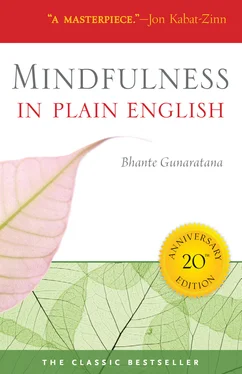Henepola Gunaratana - Mindfulness in Plain English
Здесь есть возможность читать онлайн «Henepola Gunaratana - Mindfulness in Plain English» весь текст электронной книги совершенно бесплатно (целиком полную версию без сокращений). В некоторых случаях можно слушать аудио, скачать через торрент в формате fb2 и присутствует краткое содержание. Жанр: Самосовершенствование, на английском языке. Описание произведения, (предисловие) а так же отзывы посетителей доступны на портале библиотеки ЛибКат.
- Название:Mindfulness in Plain English
- Автор:
- Жанр:
- Год:неизвестен
- ISBN:нет данных
- Рейтинг книги:3 / 5. Голосов: 1
-
Избранное:Добавить в избранное
- Отзывы:
-
Ваша оценка:
- 60
- 1
- 2
- 3
- 4
- 5
Mindfulness in Plain English: краткое содержание, описание и аннотация
Предлагаем к чтению аннотацию, описание, краткое содержание или предисловие (зависит от того, что написал сам автор книги «Mindfulness in Plain English»). Если вы не нашли необходимую информацию о книге — напишите в комментариях, мы постараемся отыскать её.
Mindfulness in Plain English — читать онлайн бесплатно полную книгу (весь текст) целиком
Ниже представлен текст книги, разбитый по страницам. Система сохранения места последней прочитанной страницы, позволяет с удобством читать онлайн бесплатно книгу «Mindfulness in Plain English», без необходимости каждый раз заново искать на чём Вы остановились. Поставьте закладку, и сможете в любой момент перейти на страницу, на которой закончили чтение.
Интервал:
Закладка:
Fully developed Mindfulness is a state of total non-attachment and utter absence of clinging to anything in the world. If we can maintain this state, no other means or device is needed to keep ourselves free of obstructions, to achieve liberation from our human weaknesses. Mindfulness is non-superficial awareness. It sees things deeply, down below the level of concepts and opinions. This sort of deep observation leads to total certainty, and complete absence of confusion. It manifests itself primarily as a constant and unwavering attention which never flags and never turns away.
This pure and unstained investigative awareness not only holds mental hindrances at bay, it lays bare their very mechanism and destroys them. Mindfulness neutralizes defilements in the mind. The result is a mind which remains unstained and invulnerable, completely unaffected by the ups and downs of life.
Chapter 14
Mindfulness Versus Concentration
Vipassana meditation is something of a mental balancing act. You are going to be cultivating two separate qualities of the mind—mindfulness and concentration. Ideally these two work together as a team. They pull in tandem, so to speak. Therefore it is important to cultivate them side-by-side and in a balanced manner. If one of the factors is strengthened at the expense of the other, the balance of the mind is lost and meditation impossible.
Concentration and mindfulness are distinctly different functions. They each have their role to play in meditation, and the relationship between them is definite and delicate. Concentration is often called one-pointedness of mind. It consists of forcing the mind to remain on one static point. Please note the word FORCE.
Concentration is pretty much a forced type of activity. It can be developed by force, by sheer unremitting willpower. And once developed, it retains some of that forced flavor. Mindfulness, on the other hand, is a delicate function leading to refined sensibilities. These two are partners in the job of meditation. Mindfulness is the sensitive one. He notices things. Concentration provides the power. He keeps the attention pinned down to one item. Ideally, mindfulness is in this relationship. Mindfulness picks the objects of attention, and notices when the attention has gone astray. Concentration does the actual work of holding the attention steady on that chosen object. If either of these partners is weak, your meditation goes astray.
Concentration could be defined as that faculty of the mind which focuses single mindedly on one object without interruption. It must be emphasized that true concentration is a wholesome one-pointedness of mind. That is, the state is free from greed, hatred and delusion. Unwholesome one-pointedness is also possible, but it will not lead to liberation. You can be very single-minded in a state of lust. But that gets you nowhere. Uninterrupted focus on something that you hate does not help you at all. In fact, such unwholesome concentration is fairly short-lived even when it is achieved—especially when it is used to harm others. True concentration itself is free from such contaminants. It is a state in which the mind is gathered together and thus gains power and intensity. We might use the analogy of a lens. Parallel waves of sunlight falling on a piece of paper will do no more than warm the surface. But the same amount of light, when focused through a lens, falls on a single point and the paper bursts into flames. Concentration is the lens. It produces the burning intensity necessary to see into the deeper reaches of the mind. Mindfulness selects the object that the lens will focus on and looks through the lens to see what is there.
Concentration should be regarded as a tool. Like any tool, it can be used for good or for ill. A sharp knife can be used to create a beautiful carving or to harm someone. It is all up to the one who uses the knife. Concentration is similar. Properly used, it can assist you towards liberation. But it can also be used in the service of the ego. It can operate in the framework of achievement and competition. You can use concentration to dominate others. You can use it to be selfish. The real problem is that concentration alone will not give you a perspective on yourself. It won’t throw light on the basic problems of selfishness and the nature of suffering. It can be used to dig down into deep psychological states. But even then, the forces of egotism won’t be understood. Only mindfulness can do that. If mindfulness is not there to look into the lens and see what has been uncovered, then it is all for nothing. Only mindfulness understands. Only mindfulness brings wisdom. Concentration has other limitations, too.
Really deep concentration can only take place under certain specific conditions. Buddhists go to a lot of trouble to build meditation halls and monasteries. Their main purpose is to create a physical environment free of distractions in which to learn this skill. No noise, no interruptions. Just as important, however, is the creation of a distraction-free emotional environment. The development of concentration will be blocked by the presence of certain mental states which we call the five hindrances. They are greed for sensual pleasure, hatred, mental lethargy, restlessness, and mental vacillation. We have examined these mental states more fully in Chapter 12.
A monastery is a controlled environment where this sort of emotional noise is kept to a minimum. No members of the opposite sex are allowed to live together there. Therefore, there is less opportunity for lust. No possessions are allowed. Therefore, no ownership squabbles and less chance for greed and coveting. Another hurdle for concentration should also be mentioned. In really deep concentration, you get so absorbed in the object of concentration that you forget all about trifles. Like your body, for instance, and your identity and everything around you. Here again the monastery is a useful convenience. It is nice to know that there is somebody to take care of you by watching over all the mundane matters of food and physical security. Without such assurance, one hesitates to go as deeply into concentration as one might.
Mindfulness, on the other hand, is free from all these drawbacks. Mindfulness is not dependent on any such particular circumstance, physical or otherwise. It is a pure noticing factor. Thus it is free to notice whatever comes up—lust, hatred, or noise. Mindfulness is not limited by any condition. It exists to some extent in every moment, in every circumstance that arises. Also, mindfulness has no fixed object of focus. It observes change. Thus it has an unlimited number of objects of attention. It just looks at whatever is passing through the mind and it does not categorize. Distractions and interruptions are noticed with the same amount of attention as the formal objects of meditation. In a state of pure mindfulness your attention just flows along with whatever changes are taking place in the mind. “Shift, shift, shift. Now this, now this, and now this.”
You can’t develop mindfulness by force. Active teeth gritting willpower won’t do you any good at all. As a matter of fact, it will hinder progress. Mindfulness cannot be cultivated by struggle. It grows by realizing, by letting go, by just settling down in the moment and letting yourself get comfortable with whatever you are experiencing. This does not mean that mindfulness happens all by itself. Far from it. Energy is required. Effort is required. But this effort is different from force. Mindfulness is cultivated by a gentle effort, by effortless effort. The meditator cultivates mindfulness by constantly reminding himself in a gentle way to maintain his awareness of whatever is happening right now. Persistence and a light touch are the secrets. Mindfulness is cultivated by constantly pulling oneself back to a state of awareness, gently, gently, gently.
Читать дальшеИнтервал:
Закладка:
Похожие книги на «Mindfulness in Plain English»
Представляем Вашему вниманию похожие книги на «Mindfulness in Plain English» списком для выбора. Мы отобрали схожую по названию и смыслу литературу в надежде предоставить читателям больше вариантов отыскать новые, интересные, ещё непрочитанные произведения.
Обсуждение, отзывы о книге «Mindfulness in Plain English» и просто собственные мнения читателей. Оставьте ваши комментарии, напишите, что Вы думаете о произведении, его смысле или главных героях. Укажите что конкретно понравилось, а что нет, и почему Вы так считаете.












